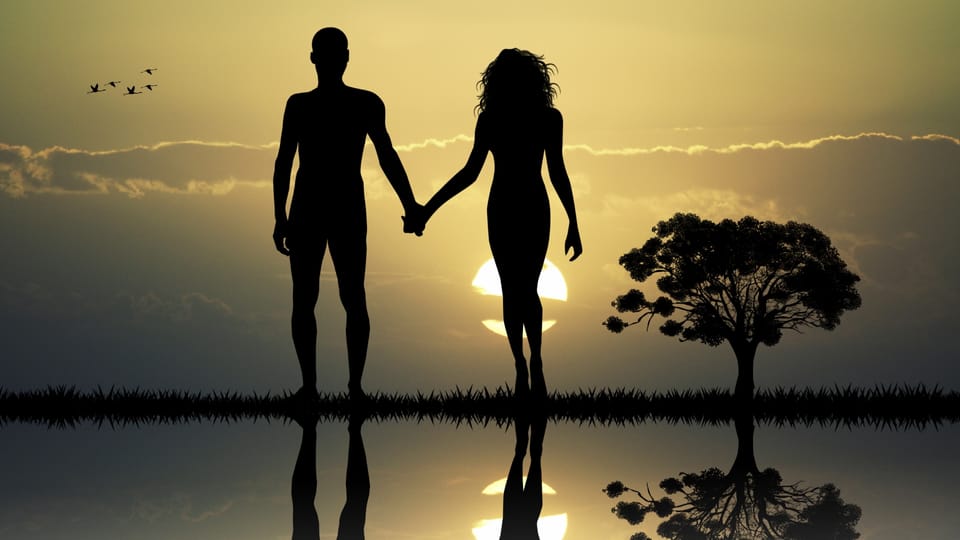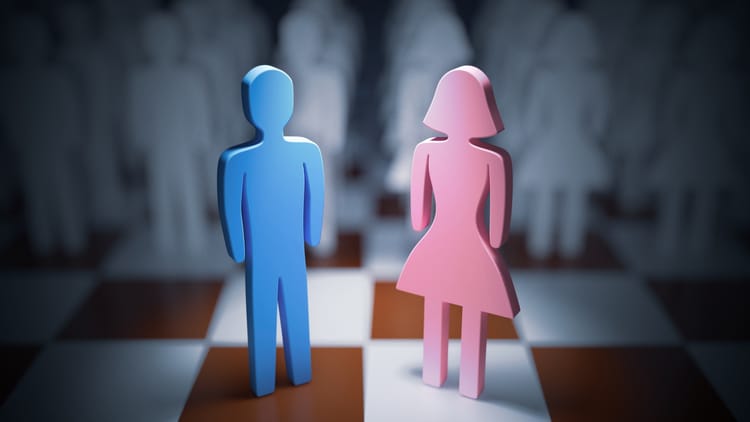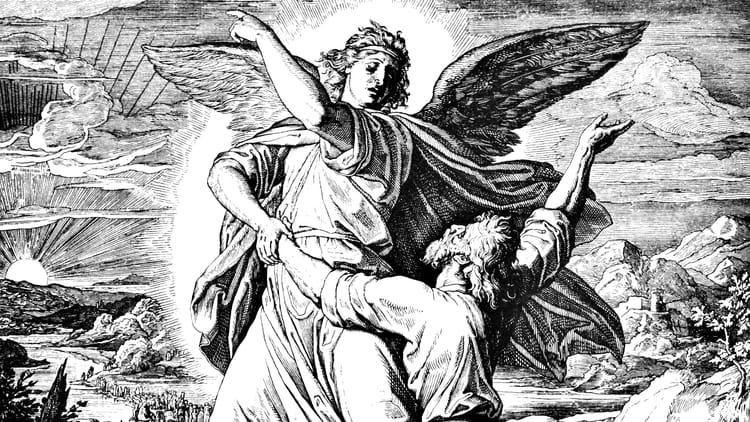Essence of God (Genesis 1:26-31)

One of the cool things about getting away from the city is seeing the sky without light pollution. Last month, on vacation, I lay on the beach one night and looked up at the sky. I had forgotten how many stars you can see in a remote place. It was absolutely stunning. The minute I looked away, Charlene saw a shooting star, which is what usually happens. It was a beautiful sight.
The number of stars you can see on a clear night is stunning, but it’s even more so when you start to hear estimates of how many stars are out there. All the stars that are visible to us are part of our galaxy, the Milky Way. We are on a planet that circles one of up to 400 billion stars in our galaxy – in our galaxy alone! Astronomers estimate that there are about 125 billion galaxies in the universe, some of which contain many more stars. I can’t begin to comprehend these numbers. It’s why I can relate to what one of the psalms says:
When I look at the night sky and see the work of your fingers-
the moon and the stars you have set in place-
what are mortals that you should think of us,
mere humans that you should care for us? (Psalm 8:3-4)
It’s a good question. Why do we rate? We’re small creatures on a small planet in a remote part of one of billions of galaxies. Statistically, we’re smaller than a rounding error. It’s hard to make much of a case for our importance given these numbers.
Today, I’d like to take us back to the beginning to look at the Bible’s account of how we came to be. A few weeks ago, we started to examine the book of Genesis, which is the first book in the Bible. The first chapter talks about the origin of everything that we see around us. It talks about creation, but it’s not primarily about creation, as much as it is about the Creator. It’s the first time that God reveals himself and what he’s like to us. It’s about God, but the passage that we’re going to read today tells us a lot about ourselves.
In the first part of chapter one, God’s been creating all kinds of things and animals. On day six, God creates us. Here’s how it reads:
Then God said, “Let us make people in our image, to be like ourselves. They will be masters over all life-the fish in the sea, the birds in the sky, and all the livestock, wild animals, and small animals.”
So God created people in his own image;
God patterned them after himself;
male and female he created them.
God blessed them and told them, “Multiply and fill the earth and subdue it. Be masters over the fish and birds and all the animals.” And God said, “Look! I have given you the seed-bearing plants throughout the earth and all the fruit trees for your food. And I have given all the grasses and other green plants to the animals and birds for their food.” And so it was. Then God looked over all he had made, and he saw that it was excellent in every way. This all happened on the sixth day. (Genesis 1:26-31)
Differences
If you read over the entire chapter, you’ll notice that the creation of humans is treated differently than the creation of everything else. This isn’t accidental. It’s there to tell us that there is a difference.
Every other day, God said, “Let there be…” When it came time to make us, God said, “Let us make…” There have been all sorts of guesses on who us is. I tend to think that God is turning to his heavenly court and telling them what he’s about to do. When God created us, it was expressed in more personal terms.
When God created humans, he announced his intent beforehand. He never did that with all the other creatures. Here, he spoke about our purpose before he even created us.
Then there’s the interesting phrase: “Let us make people in our image.” With everything else, God says that they are to reproduce after their kind. When it comes to us, God makes the point that we are made after God’s own kind. There is something of the essence of God that we carry within ourselves. Hold on to this for a minute, because this is worth pursuing.
It’s also the first time that the gender of what is created is mentioned. Gender existed before this, but it’s the first time that it was considered important enough to mention. Both genders carry God’s image. Gender is obviously important in understanding who we are.
We’re also given a job description. We’re given a role as God’s representatives here on earth, to master and to use creation.
God also blesses us. This is going to be a theme that we see coming up a number of times. Finally, he says something on day six that he’s never said before. Every other day, he’s pronounced his creation as good. On day six, after he’s created us, he looks over everything that he had made, and he pronounced it very good (or excellent). God saw what he had made and he liked it.
None of this is here by accident. The author is signaling to us that when God created us, it was different. God created everything, but we’re treated differently than everything else that was created. While we’re pretty insignificant given the size of the universe, we’re not insignificant to God. In fact, the Psalm I read earlier on our seeming insignificance goes on to say this:
For you made us only a little lower than God,
and you crowned us with glory and honor.
You put us in charge of everything you made,
giving us authority over all things-
the sheep and the cattle
and all the wild animals,
the birds in the sky, the fish in the sea,
and everything that swims the ocean currents.
O LORD, our LORD, the majesty of your name fills the earth!
(Psalm 8:5-9)
God’s Essence
The heart of this account is the statement, “Let us make people in our image, to be like ourselves” (Genesis 1:26). Your translation may say “in our image, in our likeness.” What is meant by this phrase?
The Bible never defines what this means, but we do have some hints. Kings back then would conquer a land, and would mark their conquest by setting up images as signs of their authority. It was believed that kings were made in the image of gods, but not the average person.
You have that type of idea here. God sets up his image on earth as a symbol of his authority over earth, except we are his image. He puts us in his place to rule over the earth. Instead of just male kings bearing a god’s image, he gives his image to all of humanity, male and female. But there’s more.
A few chapters later in Genesis, we see the idea of image come up again. Genesis 5 reads like this:
This is the written account of Adam’s line.
When God created man, he made him in the likeness of God. He created them male and female and blessed them. And when they were created, he called them “man.”
When Adam had lived 130 years, he had a son in his own likeness, in his own image; and he named him Seth. (Genesis 5:1-3)
God created us in his likeness, which is similar to the likeness that gets passed on to our kids. Just as you see similarities between parents and children, we see qualities in humans that resemble God. It’s not so much a list as it is a statement that we carry the essence of God. We’re like him. You can come up with lists, such as our capacity for rational thought and our spirituality, and those are okay, but it’s enough to say that we carry God’s essence.
Here’s the amazing thing: When God wanted to create something more like himself than the rest of creation, he made us. That blows me away.
Living with God’s Image
Think about this for a while, and it really changes the way that we think. We tend to either undervalue people by saying that they’re accidents, that they’re expendable. On the other hand, we can overvalue people by thinking that we’re the center of creation. Genesis gives us a different view.
Genesis teaches us about the incredible value of human life. C.S. Lewis put it this way:
There are no ordinary people. You have never talked to a mere mortal. Nations, cultures, arts, civilizations–these are mortal, and their life is to ours as the life of a gnat. But it is immortals whom we joke with, work with, marry, snub, and exploit–immortal horrors or everlasting splendors… Next to the Blessed Sacrament itself, your neighbor is the holiest object presented to your senses.
Human life has incredible value. We read later in Genesis (chapter 9) that even though the image has been tarnished as a result of sin, it’s still there, and it still makes human life valuable. We have not lost the image. James 3:9-10 says that the image of God in others prevents us from being able to say bad things about other people. Because of God’s image, we should never put down any human being. Every person, regardless of disability, age, race, gender, or sin is an image-bearer of God.
You may need to hear this about yourself. Some of us have been close to the breaking point, or beyond. You need to know that you carry something of the essence of God, something of his image.
This also tells us about what God is up to today. Colossians 3:10 says that you “have put on the new self, which is being renewed in knowledge in the image of its Creator”. People often talk about what God does in the afterlife, but God is busy right now. He’s restoring his image in us. Following Jesus means that God begins the process of image restoration within us. What God made very good in the beginning, and was then tarnished by sin, God is making perfect again.
It also means that we belong to God. One day, Jesus was asked a question by some people who were trying to trap him. They asked if they should pay taxes to the foreign government of Rome. If Jesus answered yes, then Jesus would come across as being pro-Roman and anti-Israel. If Jesus answered no, then he would be accused of disloyalty to Caesar. It was a no-win situation. But listen to what happened:
But Jesus knew their hypocrisy. “Why are you trying to trap me?” he asked. “Bring me a denarius and let me look at it.” They brought the coin, and he asked them, “Whose portrait is this? And whose inscription?”
“Caesar’s,” they replied.
Then Jesus said to them, “Give to Caesar what is Caesar’s and to God what is God’s.” (Mark 12:15-17)
Jesus said, “Coins are made in the image of Caesar, and therefore they belong to Caesar.” But he went even further. He also told us that we are responsible to give to God what belongs to God. That means that because we are made in the image of God, we belong to God. We are his. Giving him all that we are, all that we have, is the least that we can do. We belong to him.
That’s us – made in God’s image, bearers of his essence. God is restoring that image in us, and we belong to him.





